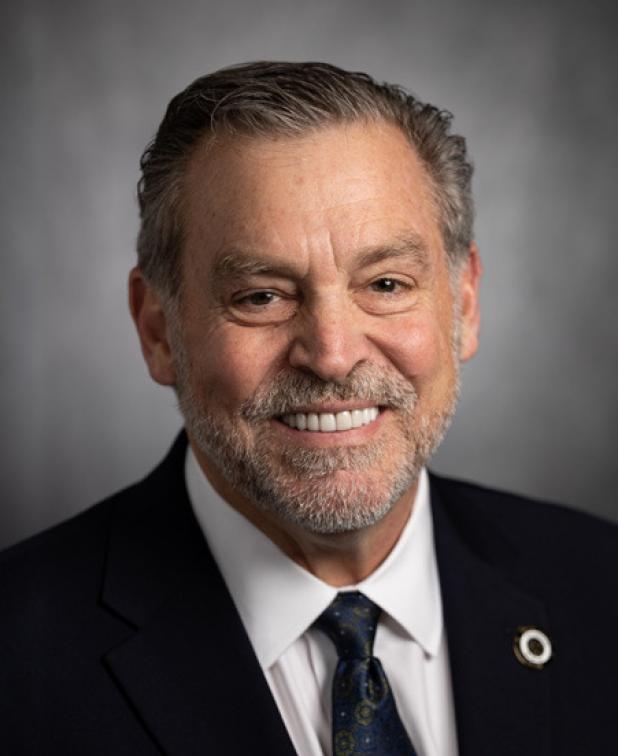

Texas House candidates spar on local issues
The Enterprise recently interviewed the two candidates running to represent Olney in the Texas House of Representatives about issues facing District 68. David Spiller, the Republican incumbent, and Ms. Swann, an author and teacher from Lampasas County, face each other in the Nov. 5 general election.
This is the first in a five-part series.
Enterprise: What is your position on school vouchers, the passage of which is likely to be a priority for Gov. Greg Abbott in the coming session? Can anything be done to preserve the financial viability of rural districts like Olney should a voucher plan pass?
Mr. Spiller: As a former Trustee of the Jacksboro Independent School District for 26 years (more than anyone in the Legislature), I have always been a strong supporter of public education and will continue to stand up for public education and rural Texas schools. My wife, Ginger, is a retired teacher of 31 years.
Our two sons, Mason and Reid, who are practicing attorneys with me, are products of public education. As a legislator, I have a constitutional duty and obligation to adequately and efficiently fund public education in Texas. However, I also support the concepts of educational freedom, parental choice, greater parental involvement in their children’s education, greater transparency regarding lesson plans and teaching materials, and parents having the opportunity to provide the best possible educational opportunities for their children.
Gov. Abbott has made it clear that he is not going to sign an educational funding bill without the establishment of a limited ESA program. While I know that ESA’s are not popular with some people in House District 68, they are supported by more of my constituents than those that oppose it.
It’s a difficult issue. I voted against the amendment to completely remove ESAs out of HB 1 last special session. Admittedly, I have concerns about ESAs as they have been presented, including the potential longterms costs to our state (including the possibility of future increased property taxes and sales taxes to pay for them), a lack of accountability, a lack of transparency, and the fact that private schools do not have the same enrollment, accessibility and other requirements placed on public schools. House District 68 covers 59 public school districts – 54 traditional public school districts and 5 public charter schools – and 9 private schools.
My obligation on this issue is to continue to work as hard as I can on behalf of my district and the best interest of the children of House District 68. I have worked with stakeholders to have the best version of the bill for my district. In the plan that was last proposed, with the exception of one school in Cooke County (which overwhelmingly supports ESAs), not a single public school district in House District 68 would have lost a single dollar or a single student to an ESA in the district.
Instead, if the bill had passed, each school district would have had: (1) an increase in the basic allotment and future increases adjusted for inflation, (2) an increase in the weights of various allotments, including those for small and mid-size schools, (3) the creation of the School Safety Fund, (4) bonuses for both full-time and part-time teachers, nurses, counselors and librarians, and a continuation of pay increases through basic allotment growth, (5) increases in the Teacher Incentive Allotment (TIA), including the high needs and rural factors of the TIA, (6) increases in Special Education funding, and (7) inclusion of a grant to offset retire/rehire penalties for classroom teachers incurred by local education agencies. I will continue to work to have a bill that does not hurt or harm my rural school districts.
Ms. Swann: I was really disappointed to see David Spiller flip that [voucher] vote because in the past, while I disagreed with him on a lot of issues, he was a strong supporter of public schools, and his wife worked in the public school system, and he was a trustee in Jacksboro.
In the primaries Greg Abbott went after the remaining Republican legislators who were against vouchers, and I was really shocked and horrified at the results of those primary elections. Because of that, I really do believe that we are on the brink for the first time in decades of actually passing a school voucher bill in the next special section.
I have not heard any recent comments from Rep. Spiller about vouchers, but it doesn’t take much imagination to see that he got Greg Abbott’s endorsement and he got a campaign donation, so it would be political suicide if he then didn’t vote for the school voucher program next session. Until he tells us otherwise, as his constituents, I have to believe that he is going to vote for that voucher bill, which I think is going to be Greg Abbott’s number one priority next session A year ago when they were first starting to push this more and Greg Abbott was campaigning on it, and [Lt. Gov.] Dan Patrick was talking about it a lot, they were worried about the support of the rural areas, as they should have been. Dan Patrick had said some vague things about how rural districts could be exempted from this, but they never provided any specifics on that. I find it hard to imagine any configuration of a bill that could opt out rural districts in a way differently from non-rural districts in terms of who is getting this money. It seems unlikely to me that you could put that [exempting rural counties from a voucher plan] into the actual legislation because if they could, they would’ve already tried that and it would have passed in those prior special sessions.
I think what’s especially frightening for our rural areas is to look at what happened in Arizona this year. Arizona passed the school voucher bill that is very similar to what Greg Abbott would like to pass here in Texas, and the vouchers exploded the budget. They had a $1.4-billion shortfall in Arizona, much of which was the result of that voucher plan.
If that happens in Texas – and like Arizona – it’s much more expensive than what they originally say it will be, we know from past experience that the first place that gets cut is public school funding.
The last time there was a significant budget shortfall in Texas was in 2011. In that shortfall, the Legislature reduced school funding by $5.4 billion. It was one of the first things they cut to balance the budget. Maybe it will take a couple of sessions for that to happen, but what you are looking at in 10 years is significant cuts to what the public schools are getting.
We are already seeing that right now. Schools did not get the funding that they expected from the last session, so all the schools making their budgets for the past two months are having these shortfalls. Some of the districts are saying, ‘We are going to have to raise local property taxes just to be able to continue the basic services we need for the school.’ To keep school doors open, all of our property taxes are going to go up and those tax levels already feel unsustainable for a lot of rural people.
I live in Lampasas County between Lampasas and Lometa, and Lometa ISD has had to go down to a fourday school week instead of five days. That was the way they chose to not raise taxes but keep the school running. But those choices impact the quality of education, too, and place additional hardships on families.
